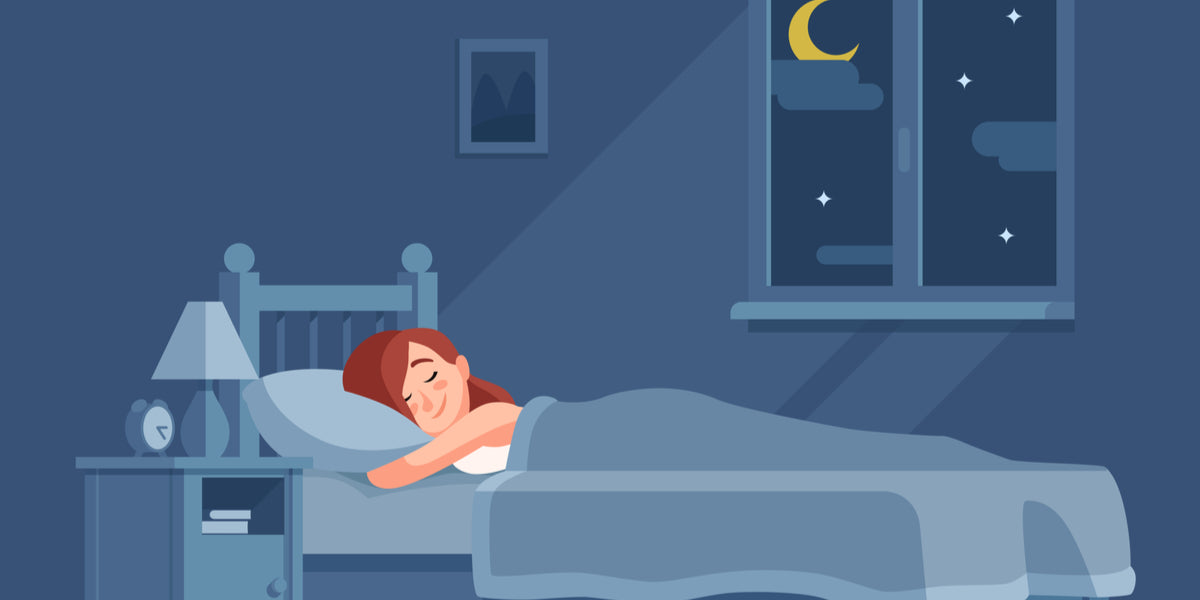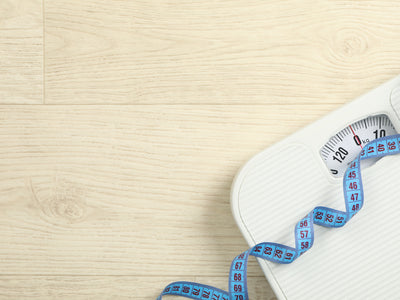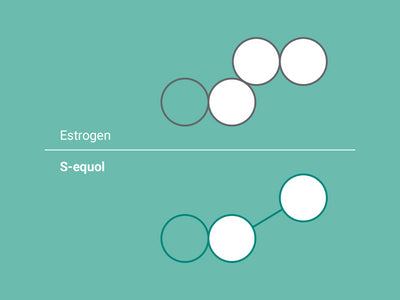
Take Back The Night: Overcoming Sleep Loss During Menopause
Sleep is precious during every stage of life, but especially during transitional periods such as menopause.1 It may not be surprising to know that women in their forties and fifties report more difficulty sleeping (insomnia) than younger women.2 A surprising 61% of women continue to report insomnia symptoms into their postmenopausal years.3 Getting a good night’s rest, however, is about more than just the number of hours we spend sleeping, rather it’s even more about the quality of those hours. For too many women, menopause is a time in which both the number of hours of sleep, and the quality of them are at constant risk due to symptoms like night sweats that can cause restlessness. Routine night sweats causing constant disruption often lead to daytime drowsiness upsetting our whole day. Understanding what’s going on inside our bodies during this time while also introducing new sleep habits, can help support more restful shuteye during menopause and beyond.
Night sweats, our hormones, and us
If you’re losing sleep because of night sweats, you aren’t alone. Despite having a different name, night sweats are actually just hot flashes that happen at night. Hot flashes are thought to be a result of declining estrogen levels communicating with the temperature regulation hub of our brains known as the hypothalamus. During perimenopause, 75–85% of women experience hot flashes, with some lasting up to three minutes, interrupting our day and much-needed night’s rest.3
Menopause disrupts our sleep cycles for reasons outside of hot flashes as well. For example, the hormone progesterone is known to induce sleep, however during perimenopause, progesterone levels are the first to be disrupted as they begin to drop.2 Declining progesterone into menopause may contribute to sleep disruptions, making it hard to fall and stay asleep.3 And while it may seem like only a few bad nights of sleep, those lost hours build up over time and affect us in ways we don’t often see until it’s too late.
The unseen effects of sleep loss during menopause
Contrary to popular wisdom, our brains and bodies don’t “shut down” during sleep, rather they use this time to do cellular repair work that helps our bodies recuperate and prepare for another day. Studies show sleep not only affects things like our mood and reaction times, but also our abilities to learn, think, and focus.2
Disruptions to our sleep pattern, which may be new due to menopause or exacerbated by it, can affect our lives in various ways. Many women report mood disorders, insomnia, and sleep-disordered breathing during this time of life.3 Sleep disruption often shows up alongside depression and anxiety as well, because in general, being tired makes everything more difficult making us more prone to feeling overwhelmed.3 Tasks that come easier to us when we’re well-rested can easily morph into a mountain overnight. When we’re tired, it’s harder to concentrate, remember things, work efficiently, and simply cope with the daily stresses of life.
Even if menopause presents new challenges to our sleep, there are still some tried and true tips that can help you get the restful hours you need.
20 tips for great sleep during menopause
There are a few things we can do to help our bodies fully rest and restore during the evening reset period, so that we can be at our best tomorrow and for days to come.
1. Find a way to move every day
Moving your body every day will improve your sleep, but be careful to avoid anything too strenuous close to bedtime.2 Not able to get in a full workout? Relaxation techniques like yoga and stretching are also shown to help—and if all else fails—make time for a walk to get some fresh air.4
2. When it comes to sleep routines, consistency is key.
Our sleep/wake cycle is just that—a regular cycle. Our bodies want to sleep and wake up at the same times every day.2 Suffering through a few hours of sleep per night during the week and trying to make up for it on the weekend won’t do our bodies any favors. Inconsistency throughout the week actually makes it harder to stick to any regular schedule.
3. Use the hour before bedtime to disconnect
Our screens can not only disrupt our sleep, but also make it harder to fall asleep in the first place. Use the time before bed to form a screen-less sleep routine. Try setting your phone to a regular bedtime setting or switching it into “Do Not Disturb” to avoid any potential distractions. Some people even find it helpful to remove all screens from their bedrooms entirely.
4. Keep an eye on your caffeine intake
Drinking a late afternoon soda, tea, or coffee can interfere with our sleep—but these commonly caffeinated beverages aren’t the only culprits. Many pain relievers, diuretics, allergy and cold medications, and weight-control aids contain hidden caffeine as well.5 So, take a look at the contents of your common over-the-counter remedies and remember that the stimulant effects of caffeine can last up to 20 hours.5
5. Avoid other medications before bed that may disrupt sleep
Commonly prescribed heart, blood pressure, or asthma medications can also disrupt sleep patterns. Ask your doctor or local pharmacist if any of your medications could be contributing to your sleep problems, and see if it’s possible to take the medications earlier in the day.
6. Turn your bedroom into an oasis
Invest in some blackout and thermal curtains to keep your room dark while also helping to reduce the heat transferred through your windows. Order a calming noise maker. Air purifiers or humidifiers can serve a double purpose by creating a cleaner air environment while also emitting a subtle white noise background.
7. Cozy up to better sleep linens
Look for breathable sheets, comforters, and sleeping apparel. There are even some mattresses that are made with cooling gels or other fabrics that circulate air flow and might help reduce the effects of night sweats. These types of fun upgrades can make for excellent gift requests from loved ones for birthdays, anniversaries, or holidays too.
8. Use the bedroom only for sleep and sex
Try to find other spots in the house where you can spend your time so that your room is limited to only the fun stuff: sleep and sex.5
9. Don’t force yourself to go to sleep
A regular sleep schedule is important, but it’s also important to listen to your body. If you find yourself lying in bed for longer than 15–20 minutes before dozing off, leave the room and enjoy a relaxing screen-less distraction until you start feeling sleepy again.5
10. Talk to your partner about their sleeping habits
Whether it’s their snoring or just being on a different sleep schedule, it’s important to have an open and honest conversation with your partner if their sleeping habits are affecting your own—and to seek a solution that works for the both of you.5
11. Avoid unnecessary napping
Following a sleep pattern helps establish a working relationship with our bodies, so that when we lie down in bed at night our body knows it’s time to sleep. Napping can disrupt this schedule and interrupt the hard work we’ve done to create a consistent sleeping routine.
12. If you really do need a quick snooze, follow the 20 by 2pm rule
That said, naps can be very helpful if you do them right. If you really need a quick snooze, set your alarm for 20 minutes and squeeze it in before 2pm. That way your nap is less likely to disrupt your sleep/wake cycle and you’re more likely to still be able to fall asleep at the right times later that night.2
13. Pay attention to how often you pee
Who doesn’t wake up in the middle of the night needing a quick bathroom pitstop? Doing this multiple times, however, is not a normal part of the aging no matter how many jokes we make about it. 6 Consistently getting up to use the bathroom in the middle of the night will disrupt REM cycles.6 If you’re struggling with urinary or bladder control, ask your doctor for help. There are treatments out there that help!
14. Trade your nightcap for a happy hour cocktail
Nightcaps may make for a classy song lyric or romantic comedy pickup line, but they’re not doing our sleeping habits any favors. While booze may have a sedative effect at first, it robs us of deep sleep, forcing our bodies to work overnight at metabolizing and processing alcohol rather than doing their usual repair and recovery work. Not to mention the harsh reality of waking up in the middle of the night once its snoozing effects have worn off.2 Heavy alcohol usage may also contribute to impaired breathing at night as well.2 If you really want that afterhours cocktail, considering meeting up for mid-to-late afternoon drinks instead. Day drinking has a bad reputation, but in this case it’s actually based on science!
15. Avoiding smoking, and eating large meals (especially spicy ones) or desserts before bed
For the same reasons that drinking should be avoided right before bed, metabolizing foods (especially spicy or acidic ones) or sweets will keep your body up all night doing what it naturally does. Nobody wants to go to bed hungry. If you’re really feeling that pang, try a light small snack instead, so long as it is free of caffeine, spice, or sweets.
16. Be aware of your sleeping habits (and if you snore)
While chronic sleep loss and disorders may affect up to 70 million Americans—some of the most common sleep disorders go unrecognized and therefore untreated.2 Snoring or intermittent breathing can be signs of an undiagnosed sleep disorder. Menopause is a great opportunity to re-evaluate many of our habits and lifestyle choices, including those involving our sleep patterns to see if there could be other health issues at play.
17. Talk to your doctor
You need your sleep. If you’ve tried everything and still aren’t finding solutions that work for you, it may be time to talk to your doctor and possibly even get a recommendation to a specialist. Temporary sleep aids can help break the insomnia cycle, though they’re not for long-term use.
Either way, don’t overlook the importance and life-changing effect a good night’s rest can have.
18. Explore your hot flash treatment options
If it’s night sweats that are preventing you from getting your best sleep, explore hot flash symptom relief treatments. There are a host of options out there including various natural and complementary approaches such as botanical supplements, mindfulness-based programs, etc. as well as prescription options such as hormone replacement therapy.
19. Lull yourself to sleep with soothing beverages
Before heading to bed, prepare by getting comfortable and enjoying a cup of caffeine-free herbal tea such as chamomile or warm milk.6
20. Find your better way to sleep better
How you choose to manage your sleep is up to you. Some of these methods are tried and true, but you’re in charge of when and how you integrate them into your lifestyle. It may help to start small and make the easiest adjustments first to see if you notice a difference. Try some light stretches, or putting your phone down for ten minutes before bed rather than committing to a full hour. If you’re the type of person who likes to go all in on something, go cold turkey. Set aside a few days to remove all screens from your room, install new curtains, swap out your linens, and begin your new sleeping routine!
References
- Kravitz, H. M., Ganz, P. A., Bromberger, J., Powell, L. H., Sutton-Tyrrell, K., Meyer, P. M. (2003). Sleep difficulty in women at midlife: a community survey of sleep and the menopausal transition. Menopause; 10, 19–28.
- US National Institute of Health - National Heart, Lung and Blood Institute. “Your Guide to Healthy Sleep”. Originated in 2005, Revised in 2011. Webpage. Accessed on November 11, 2019. <https://www.nhlbi.nih.gov/files/docs/public/sleep/healthy_sleep.pdf>
- National Sleep Foundation. “Menopause and Sleep” . 2019. Webpage. Accessed on November 11, 2019. <https://www.sleepfoundation.org/articles/menopause-and-sleep>
- Innes, K.E., Selfe, T.K., Vishnu, A. (2010). Mind-body Therapies for Menopausal Symptoms: A Systematic Review.Maturitas; 66(2): 135-149.
- North American Menopause Society. “MenoNote: Menopause and Sleep Problems”. 2015. Webpage. Accessed on November 11, 2019. <https://www.menopause.org/docs/default-source/2015/mn-sleep-problems.pdf>
- US Office of Women’s Health. “Menopause symptoms and relief – Problems Sleeping”. Originated in 2017, Updated in 2018. Webpage. Accessed on November 11, 2019. <https://www.womenshealth.gov/menopause/menopause-symptoms-and-relief >


